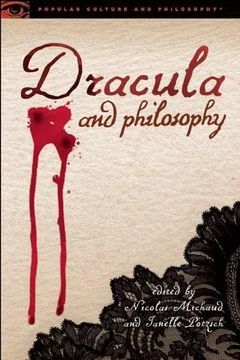Compartir
Dracula and Philosophy: Dying to Know (Popular Culture and Philosophy) (en Inglés)
Nicolas Michaud
(Ilustrado por)
·
Janelle Pötzsch
(Ilustrado por)
·
Open Court
· Tapa Blanda
Dracula and Philosophy: Dying to Know (Popular Culture and Philosophy) (en Inglés) - Michaud, Nicolas ; Pötzsch, Janelle
$ 43.254
$ 54.068
Ahorras: $ 10.814
Elige la lista en la que quieres agregar tu producto o crea una nueva lista
✓ Producto agregado correctamente a la lista de deseos.
Ir a Mis Listas
Origen: Estados Unidos
(Costos de importación incluídos en el precio)
Se enviará desde nuestra bodega entre el
Lunes 03 de Junio y el
Lunes 17 de Junio.
Lo recibirás en cualquier lugar de Argentina entre 1 y 3 días hábiles luego del envío.
Reseña del libro "Dracula and Philosophy: Dying to Know (Popular Culture and Philosophy) (en Inglés)"
In Dracula and Philosophy 24 nocturnal philosophers stake out and vivisect Dracula from many angles. John C. Altmann decides whether Dracula can really be blamed for his crimes, since it's his nature as a vampire to behave a certain way. Robert Arp argues that Dracula's addiction to live human blood dooms him to perpetual frustration and misery. John V. Karavitis sees Dracula as a Randian individual pitted against the Marxist collective. Greg Littmann maintains that if we disapprove of Dracula's behavior, we ought to be vegetarians. James Edwin Mahon uses the example of Dracula to resolve nagging problems about the desirability of immortality. Adam Barkman and Michael Versteeg ponder what it would really feel like to be Dracula, and thereby shed some light on the nature of consciousness. Robert Vuckovich looks at the sexual morality of Dracula and other characters in the Dracula saga. Ariane de Waal explains that "Dragula" is scary because every time this being appears, it causes "gender trouble." And Cari Callis demonstrates that the Count is really the Jungian Shadow archetype -- with added Shapeshifter elements -- in the journey of Mina Harker, heroine/victim of Stoker's novel, from silly girl to empowered woman.
- 0% (0)
- 0% (0)
- 0% (0)
- 0% (0)
- 0% (0)
Todos los libros de nuestro catálogo son Originales.
El libro está escrito en Inglés.
La encuadernación de esta edición es Tapa Blanda.
✓ Producto agregado correctamente al carro, Ir a Pagar.

